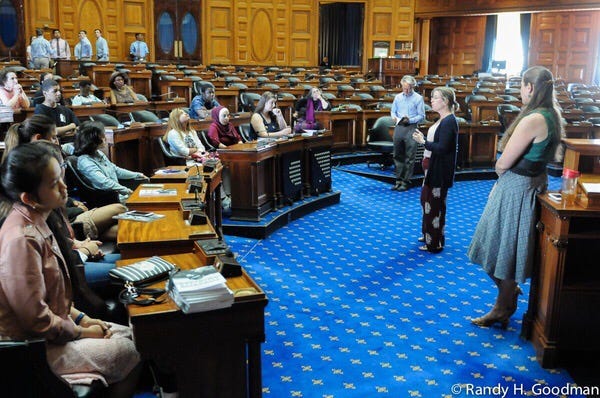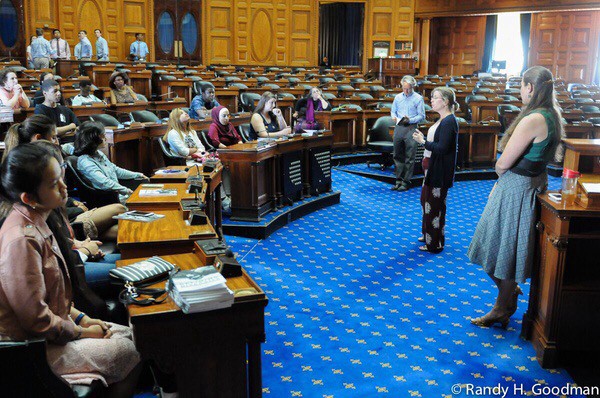Defining Diversity: Student Writing on the Violence Against Women Act
Featuring an excerpt from Lowell, MA students’ recently published book on diversity and equity
By Carla M. Duran Capellan, former Generation Citizen student and Student Leadership Board member
I was asked by Jessica Lander, my history teacher, to write a chapter for a book with twenty-three other students from the first integrated high school in the United States — Lowell High School in Massachusetts. The book set out to understand the meaning of diversity and equity in America today.
The book is a concise and inspiring journey through a century-and-a-half of seminal moments in American history told through the voices of the next generation. It explores the key ideas, federal laws, and Supreme Court decisions that have shaped our society.
As a twelfth-grade student, I chose to write about the Violence Against Women Act, because I think our society needs to know how women are protected by the law and how they should be treated. I hope that people who read this chapter will learn that women are important, powerful, and valuable.
Now, I’m a freshman at Middlesex Community College and I’m proud to see that the work and effort put into this book show our government and education system how important it is for my generation to learn about civics. I think it is important to teach young people how to participate in their communities because we are the voices of the future and the ones that are going to get done, what needs to be done. We are the ones that are going out there and be part of the generation that says, “We are going to make things different.”
I hope that everyone enjoys this book as much as we did while writing it and I hope that those parents, teachers, and the public, in general, see that civics education is the best thing that the young adults and teenagers can have in the schools and in society today.
Carla’s chapter from the book, “Defining Diversity: Students Exploring Diversity and Equity in America,” featuring essays by the students of Lowell High School’s Seminar on American Diversity and edited by Jessica Lander, is below:
“Approximately 1 in 5 women between the ages 18–24 in the United States has been sexually assaulted. In the United States, on average roughly 20 people per minute are abused by their partners — that equals over 10 million people being hurt by someone they are in a relationship with in just one year! While both men and women are abused, the majority of domestic assaults are committed by men. The U.S. federal legislation recognizes all domestic and sexual assaults as crimes and provides funds to keep local communities engaged in response to put a stop to these violent attacks.
Violence against women is not a new issue, but only recently has out government started taking it seriously. Since the 1970’s, organizations, non-profits, and politicians have been fighting to create stronger programs and laws to protect women from sexual violence, domestic violence, and stalking throughout the country. It was not until the Education Amendments of 1972, and specifically Title IX, that schools were required to address sexual harassment at their school and required to have a coordinator whose job is to make sure the school follows the law and keeps kids safe.
But until the early 1990’s, too few attachers were convicted, and too many victims were hurt and even sometimes murdered by their partner. A number of organizations fought to support women who were abused by creating crisis centers and counseling programs. Funding was limited, though, and there was still the issue that few men who abused women were being sentenced to prison. In the early 1990’s, then-Senator Joseph Biden (who later became the Vice President) and Senator Barbara Boxer started fighting for a new law to create stronger protections for women and, in 1994, Congress finally passed The Violence Against Women Act.
The Violence Against Women Act was the first time that federal law acknowledged domestic violence and sexual assault as a crime. The law acknowledged these as severe crimes instead of private family issues. The law provided funding for sexual violence training for law enforcement and created special sexual and domestic violence local police units. The law also created a number of other programs that helped provide services to victims of sexual violence and domestic violence crimes.We still have a lot more work to do to fight violence against women. We continue to see more cases of violence towards women all around the country and the world. Disturbingly, we even see this attitude from political figures. This violence against women cannot be tolerated. We must put a stop to this by teaching our generation how to treat women with respect, and by extension how to respectfully treat all people.
To read more from students, you can purchase the book here.

